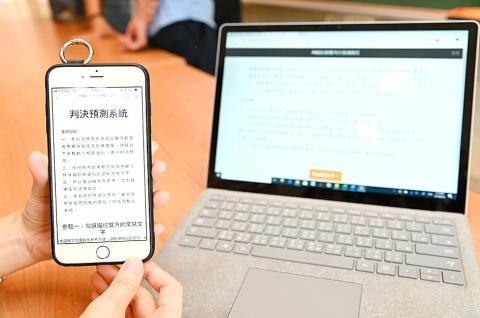National Tsing Hua University yesterday unveiled a program that uses artificial intelligence to predict the outcome of child custody cases, which the university said was more than 90 percent accurate.
The system was developed by a team headed by National Center for Theoretical Sciences physics professor Wang Daw-wei (王道維) and Lin Yun-hsien (林昀嫺), a professor in the university’s Institute for Law and Science.
The program was fed 2,000 rulings from 2015 to 2017 to serve as a database and model for judges’ decisionmaking patterns, Wang said.

Photo: Hung Mei-hsiu, Taipei Times
As custody battles are usually acrimonious and bitter, a legal resolution is not necessarily the best way, Lin said.
The program could reduce courts’ workload by allowing both parties to understand the possible results of a legal case, she said, adding that this could result in fewer court cases and waste of social resources, while increasing the number of out-of-court settlements.
A number of countries have started using AI, although it is still restricted to the analysis of potential for recividism or settling credit card disputes, Wang said.
Eventually, the program could be expanded into other legal areas, he said.
The Civil Code’s regulations on who should get custody based on the child’s best interests cite instances that are not easily defined, such as the willingness of the child to stay with the parent; the finances and vocation of the parent and how they interact with the child, Wang said.
Using the program is easy, such as ticking off certain boxes on a list or narrating the situation to the computer, Wang said.
The computer would then provide projections of the ruling, Wang said.
For example, Jane, worried that she would not obtain custody of her child if she filed for a divorce with John, who is having an extramarital affair, could tell the program that she is the primary caretaker and can provide a stable and positive life for the child while also saying that John has a stable job that could help provide for Jane and the child.
The program would provide an estimate within seconds; in this case, Jane would have a 72 percent chance of getting custody, John a 13 percent chance and joint custody a 15 percent chance, Wang said.
The program uses a technology whose patent is pending, said Lee Ya-lun (李亞倫), the team’s data science analyst, adding that it has adopted an artificial neural network to boost efficiency.
The team said it would be holding discussions with legal experts, practicing lawyers, judicial personnel and social welfare workers to obtain more data, to help them present a more rounded program with subroutines and ancillary measures that could be customized to an individual’s needs.

An essay competition jointly organized by a local writing society and a publisher affiliated with the Chinese Communist Party (CCP) might have contravened the Act Governing Relations Between the People of the Taiwan Area and the Mainland Area (臺灣地區與大陸地區人民關係條例), the Mainland Affairs Council (MAC) said on Thursday. “In this case, the partner organization is clearly an agency under the CCP’s Fujian Provincial Committee,” MAC Deputy Minister and spokesperson Liang Wen-chieh (梁文傑) said at a news briefing in Taipei. “It also involves bringing Taiwanese students to China with all-expenses-paid arrangements to attend award ceremonies and camps,” Liang said. Those two “characteristics” are typically sufficient

A magnitude 5.9 earthquake that struck about 33km off the coast of Hualien City was the "main shock" in a series of quakes in the area, with aftershocks expected over the next three days, the Central Weather Administration (CWA) said yesterday. Prior to the magnitude 5.9 quake shaking most of Taiwan at 6:53pm yesterday, six other earthquakes stronger than a magnitude of 4, starting with a magnitude 5.5 quake at 6:09pm, occurred in the area. CWA Seismological Center Director Wu Chien-fu (吳健富) confirmed that the quakes were all part of the same series and that the magnitude 5.5 temblor was

The brilliant blue waters, thick foliage and bucolic atmosphere on this seemingly idyllic archipelago deep in the Pacific Ocean belie the key role it now plays in a titanic geopolitical struggle. Palau is again on the front line as China, and the US and its allies prepare their forces in an intensifying contest for control over the Asia-Pacific region. The democratic nation of just 17,000 people hosts US-controlled airstrips and soon-to-be-completed radar installations that the US military describes as “critical” to monitoring vast swathes of water and airspace. It is also a key piece of the second island chain, a string of

The Central Weather Administration has issued a heat alert for southeastern Taiwan, warning of temperatures as high as 36°C today, while alerting some coastal areas of strong winds later in the day. Kaohsiung’s Neimen District (內門) and Pingtung County’s Neipu Township (內埔) are under an orange heat alert, which warns of temperatures as high as 36°C for three consecutive days, the CWA said, citing southwest winds. The heat would also extend to Tainan’s Nansi (楠西) and Yujing (玉井) districts, as well as Pingtung’s Gaoshu (高樹), Yanpu (鹽埔) and Majia (瑪家) townships, it said, forecasting highs of up to 36°C in those areas